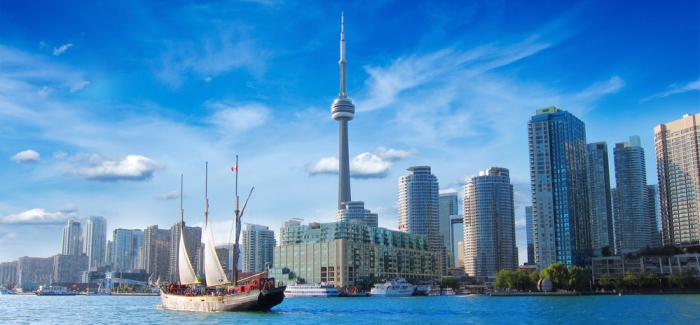Deciding to study in Canada is kind of a no-brainer, but that doesn’t mean it’s easy to pick a university. If you’ve got this far, it probably means you’ve whittled it down to two of the country’s best-performing universities: the University of Toronto and McGill University. These are the two top universities in Canada, ranked joint 29th and joint 35th in the world respectively, according to the QS World University Rankings® 2020.
Of course, there’s much more to the Canadian higher education system than just these two. 26 universities in Canada are ranked among the world’s best in the QS World University Rankings, including 12 in the top 300.
However, it’s McGill and Toronto that consistently stand out as the top two. With both performing at a highly impressive level, your choice is likely to be a more personal one.
To help any lucky prospective students facing this choice, here’s a look at how these two top universities in Canada measure up on key indicators, followed by a more detailed comparison.
|
|
University of Toronto |
McGill University |
|
QS World University Rankings® 2020 |
Ranked joint 29th worldwide in 2020 Ranked 17th in the world by academics and 27th by employers Stronger scores than McGill on faculty-student ratio and international faculty diversity |
Ranked joint 35th worldwide in 2020 Ranked 36th in the world by academics and 33rd by employers Stronger scores than Toronto for research citations and international student diversity |
|
Subject strengths* |
19th in the world for arts & humanities 11th for life sciences & medicine Joint 17th for natural sciences Joint 22nd for engineering & technology 21st for social sciences & management |
27th in the world for arts & humanities 28th for life sciences & medicine Joint 31st for natural sciences 45th for engineering & technology 37th for social sciences & management |
|
Location |
Toronto, Canada’s largest city Additional campuses in Scarborough and Mississauga |
Montréal, Canada’s second-largest city in French-speaking province Quebec (but teaching is in English) |
|
Student community |
19,356 at graduate level (21.4 percent) 17,452 international students (23.2 percent) |
10,144 at graduate level (25.3 percent) Roughly 12,531 international students (31.3 percent) |
|
Annual tuition fees |
Domestic: Undergraduate programs: from CA$6,780 ($8,603.92 including ancillary fees) Graduate: CA$10,080 to $46,270. International fees: $35,890 to $58,680. |
Undergraduate programs: from CA$2,544 for students from Quebec, $7,940 for other Canadian students International undergraduate tuition fees start at $18,440.10 and go up to $48,747.90. Fees are the same for masters degrees, and PhDs for international students cost $15,637.20. |
*Based on the broad subject areas of the QS World University Rankings by Subject.
QS World University Rankings® 2020
At rankings level, the differences between the two top universities in Canada are tiny – both are clearly among the world’s leading institutions and score well across all of the indicators used to compile the rankings. Both fare particularly well when it comes to international reputation, ranked well within the global top 50 by surveyed academics.
Toronto has the most diversity among its faculty members, as well as a better faculty-student ratio (designed to give a rough idea of how much contact time students can expect), while McGill leads on research citations per faculty member (which aims to assess research impact), and has slightly more international diversity among its students.
Subject strengths
In the QS World University Rankings by Subject, Toronto is ahead in each of the five broad subject areas. Interestingly, these rankings also suggest the two top Canadian universities have similar sets of subject strengths: both score highly for arts and humanities as well as life sciences and medicine. The main point of divergence is in engineering and technology, for which Toronto ranks joint 222nd in the world, while McGill trails behind at 45th.
|
McGill and Toronto in the QS World University Rankings by Subject 2019 |
||
|
|
University of Toronto |
McGill University |
|
Accounting & finance |
25th |
51-100 |
|
Agriculture & forestry |
51-100 |
=45th |
|
Anatomy & physiology |
8th |
10th |
|
Anthropology |
12th |
=31st |
|
Archaeology |
21st |
-- |
|
Architecture |
=39th |
45th |
|
Art & design |
51-100 |
-- |
|
Biological sciences |
12th |
=29th |
|
Business & management |
40th |
51-100 |
|
Chemistry |
17th |
38th |
|
Classics & ancient history |
=13th |
-- |
|
Computer science & information systems |
11th |
51-100 |
|
Communication & media studies |
-- |
46th |
|
Dentistry |
37th |
-- |
|
Development studies |
14th |
34th |
|
Earth & marine sciences |
22nd |
26th |
|
Economics |
21st |
51-100 |
|
Education & training |
7th |
25th |
|
Engineering (chemical) |
27th |
41st |
|
Engineering (civil) |
35th |
51-100 |
|
Engineering (electrical) |
18th |
51-100 |
|
Engineering (mechanical) |
=32nd |
27th |
|
Engineering (mineral & mining) |
22nd |
3rd |
|
English language & literature |
12th |
=29th |
|
Environmental studies |
=37th |
=26th |
|
Geography |
11th |
32nd |
|
History |
=15th |
=43rd |
|
Law |
20th |
22nd |
|
Library & Information Management |
3rd |
12th |
|
Linguistics |
21st |
=17th |
|
Mathematics |
15th |
51-100 |
|
Materials science |
48th |
=39th |
|
Medicine |
13th |
19th |
|
Modern languages |
=21st |
50th |
|
Nursing |
=7th |
=21st |
|
Performing arts |
=47th |
34th |
|
Pharmacy |
4th |
24th |
|
Philosophy |
=13th |
51-100 |
|
Physics & astronomy |
21st |
40th |
|
Politics |
=20th |
=49th |
|
Psychology |
=18th |
=24th |
|
Social policy & administration |
=18th |
-- |
|
Sociology |
18th |
37th |
|
Sports-related subjects |
5th |
28th |
|
Statistics |
14th |
=39th |
|
Theology, divinity & religious studies |
16th |
38th |
Location
Choosing between these two top universities in Canada also means making a choice between their respective cities – Montréal and Toronto. Both are in the south-east of Canada (Toronto’s a little further south) and both are large cities – in fact, they’re largest two in the country.
While Toronto is accepted as Canada’s commercial and financial capital, both cities can make claims to being the country’s leading cultural hub – and both have strong cases to make. As well as vibrant music, film and nightlife scenes, both also boast extremely high levels of international diversity. In fact, Toronto is among the world’s most multicultural cities. According to a 2011 report by the Toronto Foundation, just over half of the city’s residents were born outside of Canada.
Though Toronto may be slightly more diverse overall, Montréal has a more internationally diverse student community (see below). In the QS Best Student Cities ranking, Montréal is currently ranked fourth in the world, higher than Toronto. It’s also the best in the world according to the ‘student view’ indicator, which is based on a survey which asked students to rate their experience of a city in categories such as affordability, friendliness and tolerance and inclusion. Toronto also performed well in this indicator, coming 14th, but nowhere near as impressively as Montréal.
Montréal also achieves higher ratings than Toronto for affordability and employer activity in the ranking. The latter is based on a survey of graduate employers, domestic and international, to see which cities they prefer to recruit from. Both cities are in the top 10 for desirability, though Toronto is ahead on this indicator, ranked first compared to Montréal’s 10th.
One of the main differences between the two cities is language. Toronto is English-speaking, while Montréal, where McGill is located, is in the French-speaking province of Quebec. However, most teaching at McGill is conducted in English, and proof of English proficiency is an application requirement.
It should also be noted that while the University of Toronto’s main campus is right in the heart of the city, it also has two additional campuses, one in Scarborough (a district in the east of the city) and another in Mississauga (a neighboring city to the west).
Student community
As of the autumn 2018 enrolment, McGill had 40,036 students, of which around 12,531 (31.3 percent) were international, and about 10,144 (25.3 percent) were studying at graduate level. Of these, 19 percent of students speak French as their mother tongue.
The University of Toronto is significantly larger, with a total of 90,077 students enrolled in the 2018-19 academic year. Of these, 19,356 (21.4 percent) were studying at graduate level, and 17,452 (23.2 percent) were international. That’s a lot of students by any measure – Toronto has one of the largest student communities among institutions featured in the QS World University Rankings.
As well as being split across three campuses (see above), the University of Toronto also makes its huge community more manageable by using a college system, similar to that at Oxbridge (Oxford and Cambridge) in the UK. Applicants to the Faculty of Arts and Sciences choose one of seven colleges, each of which provides a smaller student community within the overall university.
So, if your decision about where to study in Canada can’t be made based on the course that best matches your own academic interests and career plans, lifestyle factors could certainly help tip the balance. Maybe you want to practice your French, or perhaps you like the idea of being part of a smaller college community as well as a member of a very large student body. Or, maybe, you’re just more attracted to either red (McGill's color) or blue (Toronto's)...
Fees & funding
Given their stellar reputations, McGill and Toronto may be forgiven for charging relatively high fees.
At the University of Toronto, tuition fees for undergraduate domestic students start at CA$6,780 ($8,603.92 including ancillary fees), depending on the program. For international students, prices are inevitably higher, ranging from around $35,890 to $58,680, again depending on the program chosen.
For graduate-level studies, prices span a broad range, from CA$10,080 to as much as $46,270 depending on the program. The university does state, however, that it is committed to providing financial support for those pursuing research-based graduate programs. Partial funding is also available. Toronto also recently announced that from autumn 2018 most international students will pay the same fees as domestic students for PhD programs (excluding certain programs).
At McGill University, entrance policies are slightly different, with residents of Quebec province receiving discounted fees. Prices also depend on the program. For programs within arts and sciences, residents of Quebec are charged CA$2,544 annually, non-Quebec Canadians pay CA$7,940, and international students pay CA$18,110.40 (2019/2020 figures). At graduate level, all students can enroll on a full-time master’s program for the same price as their undergraduate fees, while international students pay CA$15,637.20 for PhDs.
To take a look at the financial aid available to international students at McGill University, visit the international student funding page. Or, for more information on fees at the University of Toronto, visit this webpage.
This article was originally published in January 2014. It was most recently updated in June 2019 to include data from the latest QS World University Rankings® and other sources.
Want more information about Canadian universities and advice on admissions and student finance? Register for free site membership to get regular updates and your own personal content feed.












